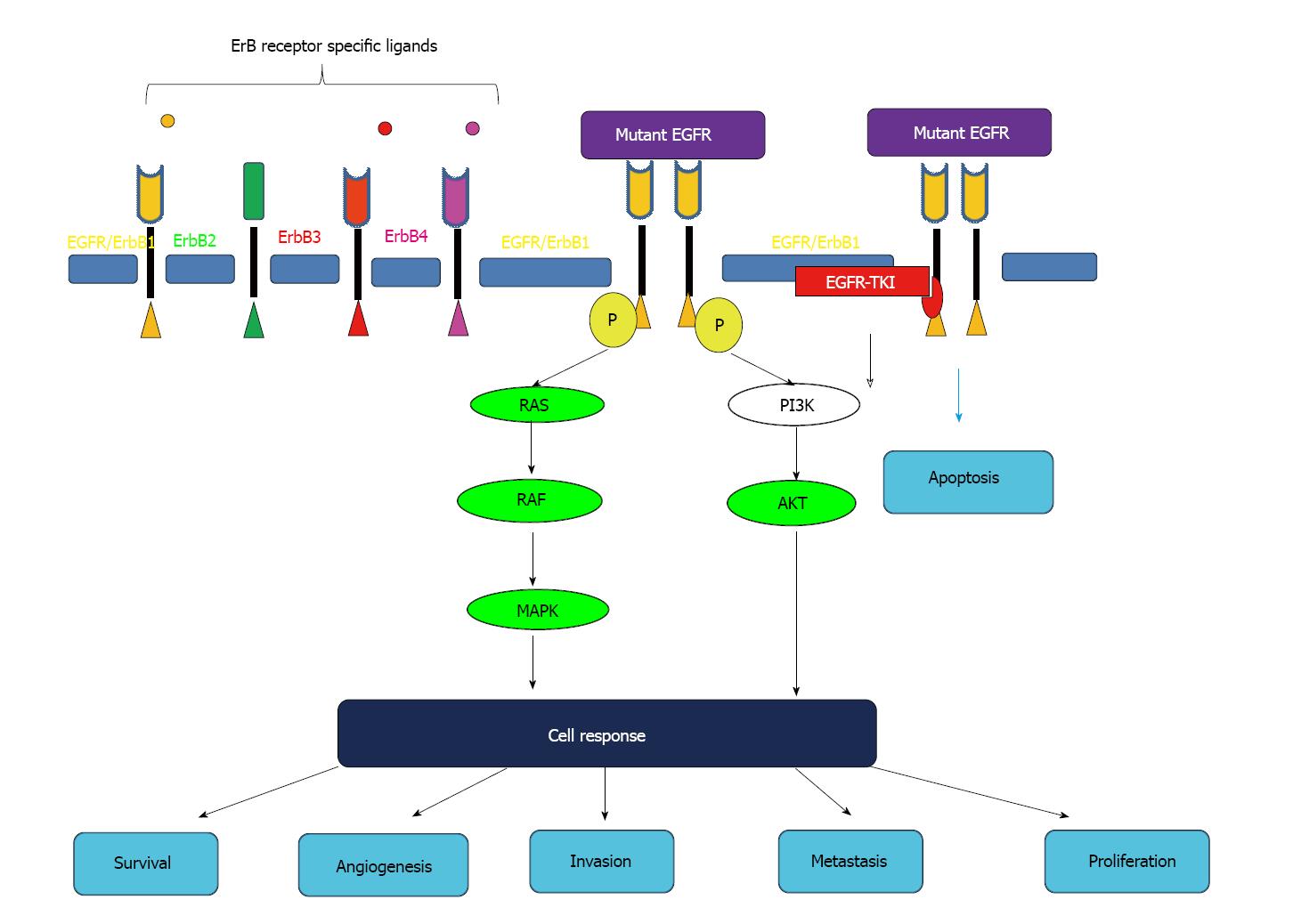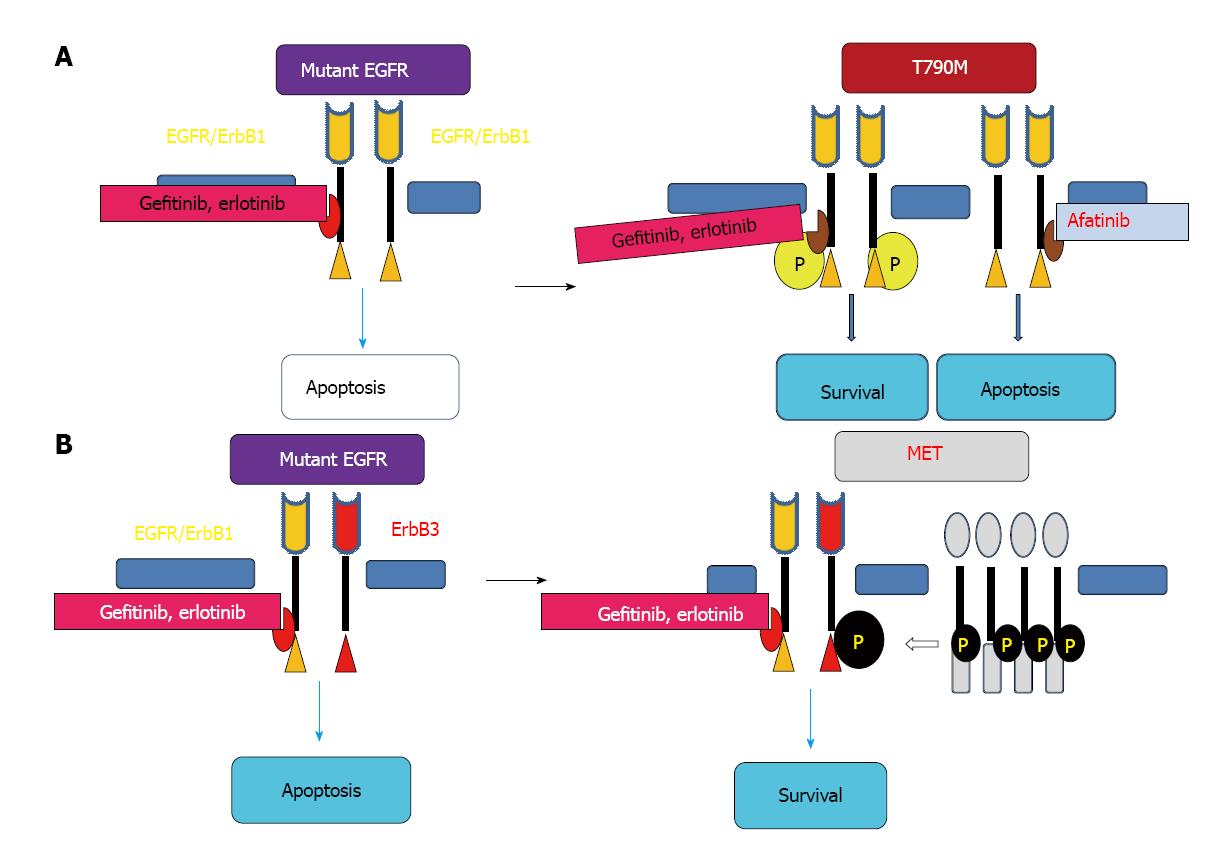Copyright
©2014 Baishideng Publishing Group Inc.
World J Clin Oncol. Oct 10, 2014; 5(4): 646-659
Published online Oct 10, 2014. doi: 10.5306/wjco.v5.i4.646
Published online Oct 10, 2014. doi: 10.5306/wjco.v5.i4.646
Figure 1 Cell-proliferative signaling pathways in lung cancer cell.
The epidermal growth factor receptor (EGFR) family consists of 4 members: EGFR/ErbB1, ErbB2, ErbB3 and ErbB4. Specific ligands (e.g., EGF, TGF-α) binding to EGFR results in a conformational change of the receptor, exposing the dimerization domain and allowing for homodimerization with a second EGFR, or heterodimerization with another member of the EGFR family. Activation of the EGFR results in autophosphorylation of key tyrosine residues. These tyrosine phosphorylated sites leads to the activation of major downstream signaling cascades, including the Ras/Raf/MAPK pathway and PI3K/AKT pathway. These pathways act in a coordinated manner to promote cell survival. While wild type EGFR is activated in a ligand-dependent manner, mutant EGFR is constitutively activated. First- or second-generation EGFR-TKIs bind reversibly or irreversibly to the kinase domain and effectively inhibit EGFR tyrosine kinase by binding to the adenosine triphosphate-binding site of the enzyme and inhibit downstream signaling, leading to apoptosis of cancer cells.
Figure 2 Major mechanisms of epidermal growth factor receptor resistance to epidermal growth factor receptor-tyrosine kinase inhibitors in lung cancer cell.
Secondary epidermal growth factor receptor (EGFR) T790M mutation prevents binding of first-generation EGFR-tyrosine kinase inhibitors (TKIs), including gefitinib and erlotinib to EGFR, resulting in cancer cell survival (A). Afatinib inhibits the ATP-binding site of the tyrosine kinase associated with EGFR T790M, leading to apoptosis of cancer cell. MET amplification has been shown to confer resistance to EGFR-TKIs by activating phosphorylation of ErbB3 with activating of the PI3K/AKT pathway, resulting in cancer cell survival (B).
Figure 3 First- and second-line treatment strategies for activating epidermal growth factor receptor-mutated advanced non-small cell lung cancer.
First- or second-generation EGFR-tyrosine kinase inhibitors (TKIs), including gefitinib, erlotinib and afatinib, are recommended as initial EGFR-TKI therapy (A and B). First-line gefitinib is recommended in patients with poorer performance status who cannot be treated with systemic chemotherapy. First- (C) or second-line (A and B) cytotoxic chemotherapy is recommended in chemotherapy naïve patients. Subsequent erlotinib may be useful in specific patients who failed gefitinib (A).
- Citation: Asami K, Atagi S. Epidermal growth factor receptor tyrosine kinase inhibitors for non-small cell lung cancer. World J Clin Oncol 2014; 5(4): 646-659
- URL: https://www.wjgnet.com/2218-4333/full/v5/i4/646.htm
- DOI: https://dx.doi.org/10.5306/wjco.v5.i4.646















